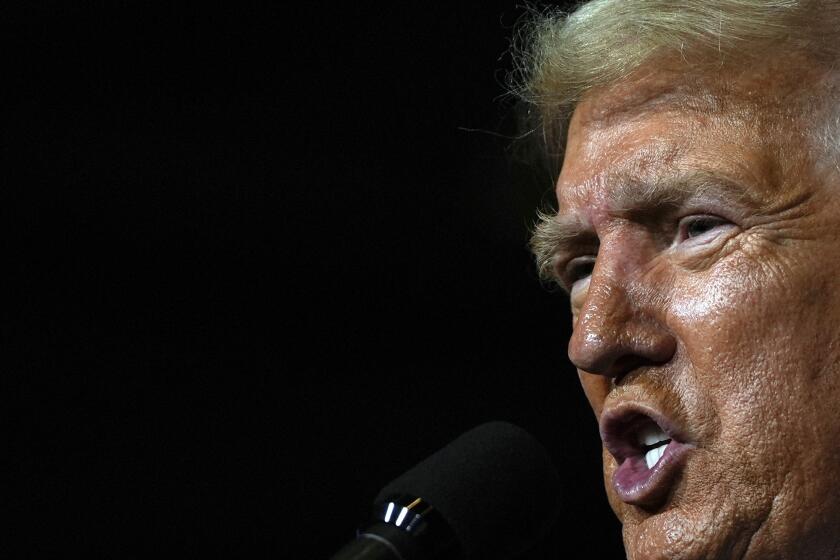On London Jaunt, Clinton Reaches Out to Iran
In unusually conciliatory tones, President Clinton on Thursday described last week’s election victory of a moderate leader in Iran as a “hopeful development” and termed Iranians “a very great people.”
But Clinton said “big hurdles” continue to block closer ties with the Islamic nation that has been estranged from the United States for 18 years.
The president made his comments in a far-ranging news conference here with British Prime Minister Tony Blair, a political soul mate he visited Thursday before departing Europe for home at the end of a three-day trip.
The two leaders discussed problems that have slowed the peace processes in Bosnia-Herzegovina and Northern Ireland--Clinton urged terrorists there “to lay down their guns for good”--and other shared concerns on a sunny day in which their friendship was evident.
Blair complimented Clinton for “blazing the trail” of centrist politics that brought both men to power.
Earlier in the day, Clinton became the first president to meet with Britain’s Cabinet since Richard Nixon in 1969.
Over a lunch of halibut, Clinton and Blair talked business--including a discussion of their shared experience of raising children while holding high office, according to a Clinton administration official.
In the afternoon, after First Lady Hillary Rodham Clinton took off with Cherie Booth, Blair’s wife, for a performance of Shakespeare’s “Henry VI,” the two men strolled into the sun-bathed garden behind Blair’s official residence at 10 Downing St. and met with members of the U.S. and British media.
Asked for his view’s of Mohammad Khatami, the moderate cleric elected president of Iran last week, Clinton called his victory “a hopeful sign.”
“I have never been pleased with the estrangements between the people of the United States and the people of Iran,” Clinton said. “They are a very great people, and I hope the estrangements can be bridged.”
The president’s tone was in keeping with the advice of some experts who have argued that it is time for the U.S. to take a less belligerent view of Iran despite almost two decades of acrimonious relations between the two countries.
But Clinton made clear three basic conditions for repairing the breach: Iran must relinquish support of terrorism, abandon violence that he said Iran supports to “wreck” the Middle East peace process and stop trying to develop nuclear weapons.
“Those are three big hurdles that would have to be cleared, and we’ll just have to hope for the best,” he said.
Khatami has said he does not expect any warming of relations, and James Steinberg, U.S. deputy national security advisor, said the administration does not plan any new initiatives toward that goal.
Clinton also sparked interest by discussing lagging democratic progress in Bosnia, a reality that raises questions about whether the 8,500 U.S. troops still there will return home by the June 1998 deadline.
“We’re not on schedule” in establishing a civilian police force to escort refugees home or in rebuilding the economy, as prescribed by the Dayton, Ohio, accord signed in December 1995, Clinton said.
“And if we work like crazy in the next 13 months, do I believe we can fulfill our mission? . . . Yes, I do. But I think we’re going to have to make some very tough decisions. We can’t play around with this. We can’t just sort of hang around, then disappear in a year and expect the Dayton process to go forward.”
Clinton’s comments prompted immediate speculation that he was setting the stage to prolong American troops’ stay in the troubled region, but White House aides insisted that Clinton was merely acknowledging the challenge of establishing a lasting peace quickly.
“I don’t think he left that impression, nor is [it] his intention” to keep the troops longer, said a senior administration official who maintained that the White House believes that the deadline can be met “if there’s a really effective effort.”
Blair, who at 44 is six years younger than Clinton, looked on approvingly as his American counterpart spoke.
The two men frequently have been compared for pushing their parties toward the political center--and gaining votes in the process by emphasizing education and welfare reform simultaneously with personal responsibility and leaner government.
Clinton seemed the more comfortable with the media, quipping that he resents the fact that Blair is several years his junior and has “no gray hair.”
The two appeared to be of similar minds on the subject of Northern Ireland.
“We have discussed, obviously, Northern Ireland and our determination to do all that we can to bring about the cease-fire that will allow all-party talks to proceed in the best possible climate and of a cease-fire that is genuine and credible with all the parties there,” Blair said.
Clinton agreed, saying talks in Northern Ireland “can only succeed if there is an unequivocal cease-fire in deed and words,” and he urged the Irish Republican Army to lay down its guns.
Before he met with Blair’s Cabinet, Clinton described the hope for peace in Northern Ireland as “an article of faith in my life and household.”
Later Thursday, the president and first lady met the Blairs for dinner at London’s Le Pont de la Tour restaurant, billed as “wine merchants, bar and grill, food store, baker, oil and spice shop.”
More to Read
Sign up for Essential California
The most important California stories and recommendations in your inbox every morning.
You may occasionally receive promotional content from the Los Angeles Times.










